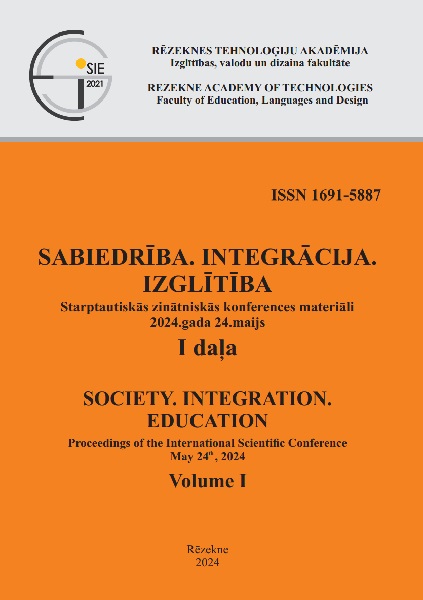WHAT DO NATIONAL TESTS SHOW ABOUT STUDENTS’ PERFORMANCE AT THE END OF PRIMARY SCHOOL IN DIFFERENT MUNICIPALITIES?
DOI:
https://doi.org/10.17770/sie2024vol1.7880Keywords:
education equity, national test, student assessment, student performanceAbstract
One of the key principles of education policy is equal opportunities for children to access quality education. This principle applies not only to the allocation of resources but also to the equality of educational outcomes at both the individual and social group levels. This study analyses students’ (15–16 years old) performance in the national examinations (centralised examinations of school year 2022/2023) in Latvian, mathematics, and the first foreign language (English) at the end of compulsory education in the context of different municipalities. Students’ performance was analysed within 43 municipalities using classical test theory and test-response theory (Rasch model). In most municipalities, students’ performance on the national test in mathematics, Latvian language and the first foreign language (English) is in line with average performance. The results of the national examinations show a geographical correlation in the distribution of students’ performance between municipalities. High performance is mainly found in some municipalities of the Baltic Sea Region, and in mathematics, also in Riga. No geographical correlation was found in the municipalities with low performance in mathematics, while low performance in Latvian and English was found in several municipalities in the Latgale region. The comparison of the performance of educational institutions in the national examination shows that there are significant differences not only between municipalities but also between educational institutions within the same municipality. The analysis of the results indicates significant risks of unequal opportunities for access to quality education. This is particularly the case in the country's largest cities: Riga, Daugavpils, and Jelgava.
References
Adolfsson C.-H., Alvunger, D. (2020). Power dynamics and policy actions in the changing landscape of local school governance. Nordic Journal of Studies in Educational Policy, 6(2), 128–142.
Boone, W. J., Staver, J. R., & Yale, M. S. (2013). Rasch analysis in the human sciences. Springer.
Burgmanis, Ģ. (2023). Datos balstīta lēmumu pieņemšana attīstības risinājumiem izglītībā. No D. Namsone (sast.), Datu zinātībā skola (16-29). Rīga: LU Akadēmiskais apgāds.
Burgmanis, Ģ., Pestovs, P. (2023). Trīsdimensionāla pieeja skolēna snieguma analīzei. No D. Namsone (sast.), Datu zinātībā skola (53-71). Rīga: LU Akadēmiskais apgāds.
Čakāne, L., & Butkēviča, A. (2018). Inovāciju pārnese skolā un starp skolām. Mācīšanās lietpratībai, (232–250) Rīga: LU Akadēmiskais apgāds. Pieejams: https://doi. org/10.22364/ML.2018.10
Grissom, J. A., Rubin, M., Neumerski, C. M., Cannata, M., Drake, T. A., Goldring, E., & Schuermann, P. (2017). Central office supports for data-driven talent management decisions: Evidence from the implementation of new systems for measuring teacher effectiveness. Educational Researcher, 46(1), 21–32.
Guskey, T. R. (2013). The Case Against Percentage Grades. Educational Leadership, 71(1), 68–72.
Hess, R. T., & Robbins, P. (2012). The Data toolkit: Ten tools for supporting school improvement. Corwin Press.
OECD. (2018). How decentralised are education systems, and what does it mean for schools? Education Indicators in Focus, No. 64. Paris: OECD Publishing.
McNaughton, S., Lai, M. K., & Hsiao, S. (2012). Testing the effectiveness of an intervention model based on data use: A replication series across clusters of schools. School Effectiveness and School Improvement, 23, 203–228.
Mandinach, E. B. (2012). A perfect time for data use: Using data-driven decision making to inform practice. Educational Psychologist, 47(2), 71–85.
Mandinach, E. B., & Schildkamp, K. (2021). Misconceptions about data-based decision making in education: An exploration of the literature. Studies in Educational Evaluation, 69, 100842.
Poortman, C. L., & Schildkamp, K. (2016). Solving student achievement problems with a data use intervention for teachers. Teaching and teacher education, 60, 425–433.
Rorrer, A. K., Skrla, L., & Scheurich, J. J. (2008). Districts as Institutional Actors in Educational Reform. Educational Administration Quarterly, 44(3), 307–357.
Sahlberg, P. and Cobbold, T. (2021). leadership for equity and adequacy in education. School leadership and Management, 41(4-5), 447-469. https://doi.org/10.1080/13632434.2021.1926963
Saleniece, I., Namsone, D. (2023). Datos balstīti lēmumi pārmaiņu efektīvai vadībai pašvaldības līmenī. No D. Namsone (sast.), Datu zinātībā skola (169-189). Rīga: LU Akadēmiskais apgāds.
Schildkamp, K., Poortman, C., Luyten, H., & Ebbeler, J. (2017). Factors promoting and hindering data-based decision making in schools. School effectiveness and school improvement, 28(2), 242–258.
Slavin, R. E., Cheung, A., Holmes, G., Madden, N. A., & Chamberlain, A. (2013). Effects of a data-driven district reform model on state assessment outcomes. American Educational Research Journal, 50(2), 371–396.
Wahlström, N., & Sundberg, D. (2017). Transnational curriculum standards and classroom practices: The new meaning of teaching. New York: Routledge.
Wiliam, D. (2011). What is assessment for learning? Studies in educational evaluation, 37(1), 314.






